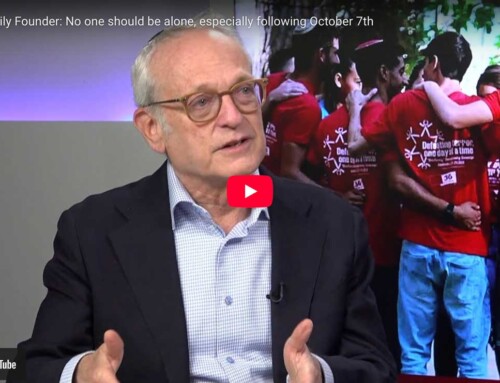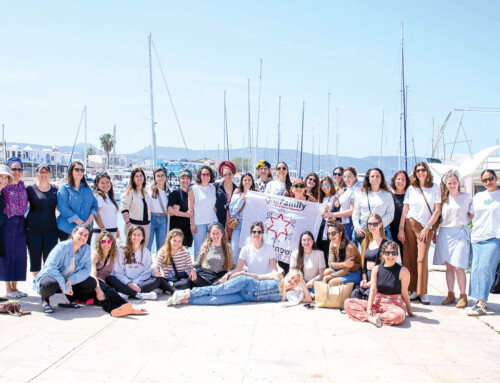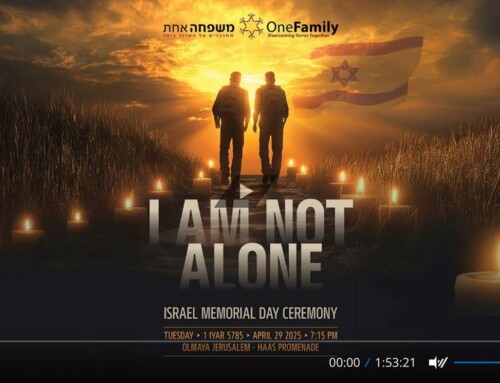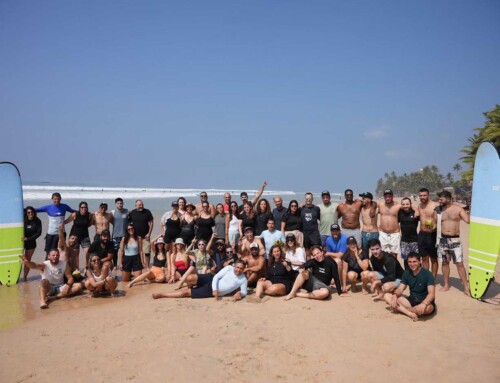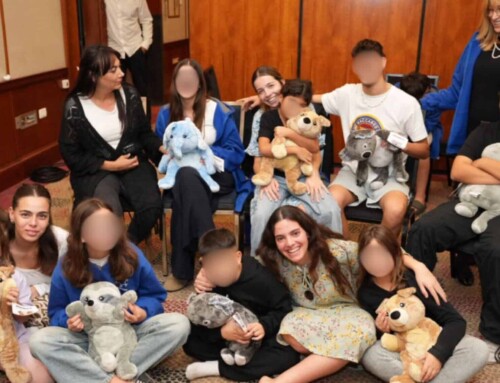Original source: Article published in The Times of Israel – by, Simone Somekh
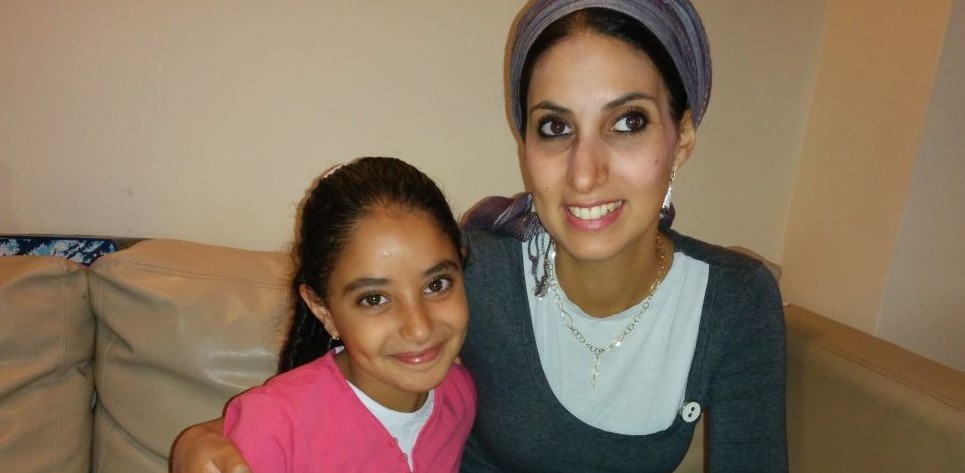
Sent north for R&R away from near-constant fire, residents of the south talk about a routine of periodic nuisances punctuated by terror and tragedy
TIBERIAS — Ortal Dadya has had rockets land next to her twice in two years.
The first time was in 2006, when Dadya, a mother of two from Sderot, watched a Kassam rocket impact next to her car. A year later, another rocket hit while she was walking outside. Her shoulders, left leg and back were injured, said Dadya, who still lives in Sderot with her family.
“Since the rocket barrage hasn’t stopped over last month, I haven’t left the safe room in my house,” she said. “We even eat there. It’s been very hard.”
Dadya sat with her 5-year-old daughter in the lobby of the Bali Hotel in Tiberias near the Sea of Galilee, gluing tiny sequins on a hand-shaped piece of cardboard called a hamsa. They were in the northern city for a three-day retreat organized by OneFamily Together, a nonprofit organization that helps rehabilitate and reintegrate Israel’s victims of terror.
The retreat brought hundreds of terror victims up north over the past two weeks, and aims at helping the families that have been re-traumatized by the endless rocket attacks from Gaza.
The rockets have been a threat for many years. But the last few weeks have been a nightmare for Dadya and other families living in Israel’s south.
“My daughter has also started being scared of the situation,” she said. “It was never like this before. You can’t sleep. The other night, there was noise all night long, and the whole building was shaking. The danger seems closer. We hear all the explosions taking place in Gaza.”
She can’t remember a time when she went out on the street without first checking the location of the shelters in case of a rocket attack.
“It’s been too many years now,” said Dadya.
The best thing about the retreat up north was being able to shower and sleep for a full night without worrying about sirens.
“I’ve missed that,” she said.
A low-sounding alarm sounded in the hotel lobby, and Dadya jumped out of the chair.

It wasn’t a siren, but like most of the participants at the retreat, Dadya reacts to anything that reminds her of life in Sderot. She suffers from post traumatic stress disorder, said a staff member, a condition many of the participants suffer from.
Psychological trauma is the reality that thousands of terror victims have to face, along with the physical injuries inflicted by suicide bombers and rocket attacks. OneFamily – founded in 2001 by 12-year-old Michal Belzberg after a terror attack took place at the Sbarro pizza shop in downtown Jerusalem – places the psychological issue on top of its agenda.
The organization has helped 3,500 families, about 12,000 people, a number that has grown dramatically over the last month.
“Whenever someone gets injured or killed in a terror attack, we immediately contact their family and offer emotional, legal and financial support,” said Rebecca Fuhrman, OneFamily’s marketing director. Emotional support, she stressed, is crucial.
At the retreat, located at a hotel overlooking the Sea of Galilee, kids were playing in the pool or licking ice popsicles distributed by the hotel staff. But the nightmarish experiences they’ve had down south are never far from mind.
Life in the line of fire is a constant interruption, said the residents. It’s impossible to cook a meal, finish reading a book or complete a conversation on the phone. Safe rooms turn into prisons, where entire families sleep, eat, study and work.

The rocket barrage has become a routine but terrifying part of the local population’s daily lives, said a staff member, a constant barrage that’s more frightening than ever before.
“Our two-year-old, Noa, knows exactly what to do when she hears the siren: she immediately runs into the safe room,” said Avital Afgin, an elementary school teacher from Ashkelon who has four children.
Afgin said that her faith in God plays a central role in times like this. She was injured in 2008 with her daughter Tair, then aged two, when a rocket landed on a mall in Ashkelon. They were there for a fun day out, said Afgin.
“A rocket landed on the mall, with no siren sounding,” she said. “We happened to be in the middle of the chaos. Luckily, Tair doesn’t remember anything. But we both got seriously injured and were in very critical condition.”
They stayed at Tel Hashomer for three months. Half of Afgin’s face had to be reconstructed, and her jaw was rebuilt. Her eye is still injured and Tair had a cast for two years after the attack.
“The body naturally ejects the smaller pieces of shrapnel,” said Afgin, “but the bigger ones remain. I have pieces
OneFamily, she said, “was amazing. They never left us.”

Everyone had similar stories. Yaron Yarosky, another Sderot resident, is still traumatized after a rocket fell on his house several years ago. The 14-year-old refuses to talk about what exactly happened that day, and whenever a siren sounds, the fear returns.
Life under the rockets is scary, said Yarosky, whose English is perfect thanks to all the time he spends watching TV at home in his safe room. The local Iron Dome is located next to his house, so they hear the boom of the missile interceptor before the siren sounds.
“The rockets don’t stop me from seeing my friends,” said Yarosky while repeatedly checking his Samsung phone for Red Alert app notifications. “But I only see the ones who live close to my house.”

During the retreat, the terror victims were offered a variety of therapies, including reflexology, massage and acupuncture. Group and individual therapies with a psychologist were also held daily.
In a room next to the lobby, about 15 participants sat in a circle and vented about their struggles together with Yonatan Amit, a psychologist.
“What bothers you the most?” asked Amit.
“The sirens. I jump every time I hear a loud noise,” said one woman.
“The bureaucracy” involved in getting government help, replied a couple, who described it as slow and complicated. It’s difficult to get recognized as a terror victim if the injury did not come directly from the attack itself. Their son was injured in the chaotic circumstances of a rocket siren sounding, and they often have trouble receiving the proper reimbursements for his care.
OneFamily can help with the bureaucratic issues, said Fuhrman.
“We have social capital,” she said. “We are able to connect the victims with the right people. We are in touch with hospitals, banks and insurance companies. When it comes to terror attacks, we are the missing piece.”

Outside at the swimming pool, surrounded by the sounds of kids playing, Jacqueline Ivgi cried, thinking about her son David, who was killed in 2012 by a rocket during Operation Pillar of Defense. He died after months of surgeries, but never regained his speech, only opening his eyes to communicate with his family.
“I knew that he could hear us, and feel our love,” she said. “We were with him nonstop, for the year and eight months in various hospitals.”
Her phone rang. It was Pinni Rabinovich, southern region coordinator of OneFamily, asking her how was she doing. The organization has been a steady presence in their lives, said Ivgi, visiting them in the hospital, bringing gifts for her grandchildren, organizing their birthday parties.
Since Operation Protective Edge began, said Ivgi, she doesn’t leave her house. When she hear the sirens, she sits in her stairwell.
“I wasn’t so scared before, but now that it happened to my son, I don’t want to leave the house,” she said. “I cry every time I hear about other Israelis dying – even if I don’t know who they are.”
She sat by the pool, smoking a cigarette, while her daughter-in-law played with her children, Ivgi’s two grandchildren, in the pool.
David’s son, Rom, entered first grade while David was still unconscious in the hospital, said Ivgi.
“He would visit his father and tell him “Dad, do you know that I can read now,’” said Ivgi, weeping. “And do you know what he said to me in the swimming pool a few minutes ago? Rom told me, “I know who loves me the most in the world – Dad.”

